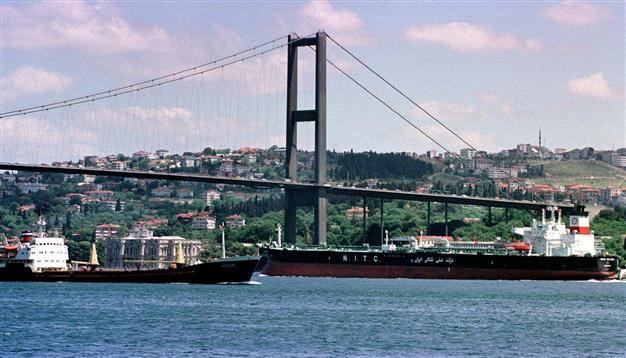Record number of ships sail through Bosphorus in 2014
ISTANBUL – Anadolu Agency

With traffic breaking records this year, renewed attention has turned to safety measures on the Bosphorus Strait, which famously divides Europe and Asia.
More than 26,663 vessels have passed through Istanbul’s Bosphorus Strait, marking an increase of 200 vessels in the first seven months of this year compared to the same period in 2013, Turkey’s Maritime Affairs Ministry has said.The 16-mile-long continent-dividing strait, which is the only waterway between the Black Sea and the Marmara Sea, is used by approximately 127 vessels, including 25 tankers, on a daily basis. Some of the vessels weigh as much as 200,000 tons, often carrying oil, gas, chemicals, nuclear waste, arms and other hazardous materials.
The ministry stated that 14,082 ships, including 5,327 tankers carrying highly flammable chemicals, used Turkish pilots to guide them through the channel, as a precautionary measure due to the numerous accidents that have occurred in the past.
On Nov. 15, 1979, Romanian tanker M/T Independenta collided with the Greek flagged M/V Evriali near the shores of the Haydarpaşa Station, killing almost all passengers on board the ship, which exploded and burned for days. The accident was recorded as one of the deadliest naval accidents in the history of the strait, with more than 90,000 tons of crude oil spilling and polluting the Bosphorus for a number of years.
In 1991, a Philippines flagged vessel collided with a Lebanese flagged livestock carrier, leading to more than 21,000 sheep drowning.
In 2000, a Russian tanker split into two and 1,500 tons of oil spilled into the sea. The clean-up operation of the contaminated beaches lasted around two years.
“More than 700 accidents have occurred in the Istanbul and Dardanelles Straits in last 50 years,” said Captain Saim Oğuzülgen, who is the Director for Turkish Straits Research and Implementation Center at Istanbul’s Bahçeşehir University.
“These accidents have killed hundreds of sailors, dozens of ships have sunk or burned, thousands of tons of crude oil or petroleum products have been spilled into the sea and an incredible amount of environmental pollution has occurred. Everyone wants the necessary precautions to be applied to avoid similar accidents in the future,” Oğuzülgen added.
Nevertheless, Turkey is dedicated to applying to the 1936 Montreaux convention, which states that the Bosphorus' main principle in peace time is freedom of passage.
“Turkey has been properly and impartially implementing the Montreux Convention for the last 78 years,” a Foreign Ministry official told Anadolu Agency.
Following the accidents of the 1990s, Turkey implemented new legislation stating that vessels longer than 150 meters have to be guided by pilots. In addition, vessels that function on automatic pilot are prohibited and ships powered by nuclear energy or carrying hazardous materials must first report to the Environment Ministry for permission to pass.
However, despite all the legislation and precautions put in place, the risk of new accidents in Turkey’s most congested waterway remain.
















